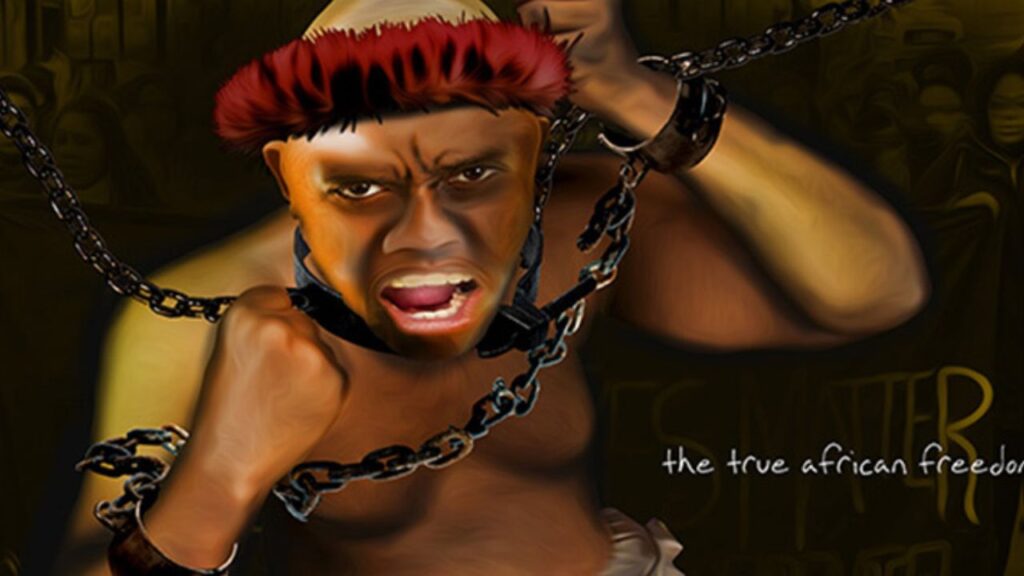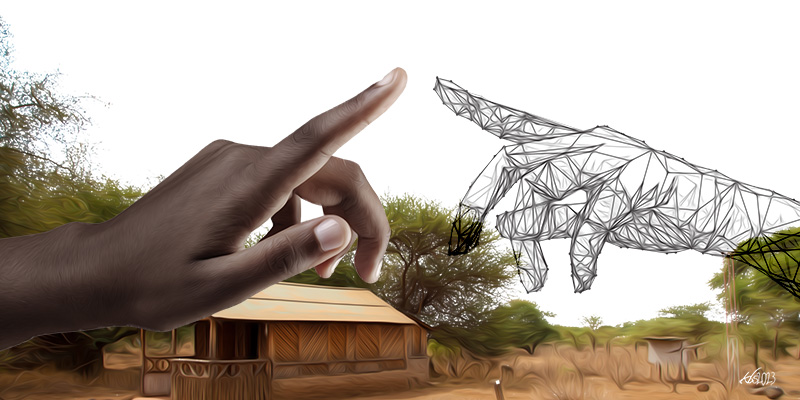Punctuated evolution describes how brief but explosive episodes of change have redirected the long course of evolution. The concept originated from Steve Jay Gould’s study of the fossil record. Several anthropogenic advances have likewise ‘punctuated’ the normal process of incremental change driving our species evolution: the discovery of tool making, emergence of human speech, domestication of plants and animals, and the four technological revolutions have all brought us to the current life-on-earth-threatening threshold.
On the much smaller scale of individual societies, progress results from the accumulation of many smaller steps. But sometimes an event, a creative work of art, disruptive invention, or insightful academic analysis coincides with other developments to ‘punctuate’ the dominant narrative. Even a seemingly isolated or random incident, like the story about a coke bottle dropping out of the sky in the Kalahari, can set a series of changes in motion.
Mohammed Bouazizi was not thinking about the Arab spring when he set himself on fire in Tunisia. The film Out of Africa of Africa was not expected to reconfigure Kenya’s tourism industry, but it triggered a boom leading to the sector’s diversification and unique new facilities. No one thought the international debate on neocolonialism spawned by Colin Leyes’ 1974 book, Underdevelopment in Kenya, would result in the legitimization of Kenya’s indigenous capitalism. By the same measure, the editors at The Elephant probably did not expect the Millennial Edition to feature at the front end of a larger social movement, although this might be in the making.
Maybe. The timing is right, the numbers are there, but Kenya’s power elite has countered the trajectory of reforms dating back to the 1990s. Economic liberalization, political pluralism, the 2002 opposition victory, institutional restructuring, a coalition government, and the new constitution have all failed to unlock the population’s aspirations.
If a government refuses to evolve by conventional means, why not a generational revolution?
The millennial writers’ personal vignettes hint at a vast reservoir of untapped power. Their collective angst should be seen as a warning. Their generation’s pent-up energies will either align with other factors to exert a system-changing impact across the region, or they will become another source of the country’s creeping entropy.
If a government refuses to evolve by conventional means, why not a generational revolution?
The Millennial Edition Revisited
Kenya’s millennials grew up during the time when concepts like sustainability, accountability, and transparency were driving global narratives. They came of age during the interlude punctuated by the fall of the Berlin wall, the collapse of Marxist and right-wing dictatorships, the rise of political pluralism, adoption of participatory development, and the expansion of higher education. The first generation to take digitalization for granted and to be connected by the spread of social media never had to stockpile coins for making a phone call. They are entering their prime during the period Barrack Obama proclaimed to be the best time to be alive in human history.
Under 35 Kenyans are the ostensible beneficiaries of these positive developments, but the succession of articles appearing in The Elephant depicts a different reality. The essays are articulate, entertaining, and illuminated by the authors’ personal experience. The diverse collection conveys a multidimensional and nuanced view on a variety of issues, but there some common threads.
The Swahili adage that states, ‘where the elders are present nothing will go awry’ attests to the gerontocracy’s role in African governance. But many among Kenya’s younger generations no longer accept the import of this ‘pasipokuwa na wazee neno haliharibiki‘ wisdom. They see the elders as the cause of their present predicament.
Joe Kobuthi’s essay, Starin’ at the World Through My Rearview, provides a comprehensive overview of his generation’s current dilemma. He cites Francis Fukuyama’s declaration that victory of liberal democracy signified the ‘End of History’ to set the stage for his assessment of developments in Kenya. The ascendency of the neoliberal monoculture that dovetailed with the end of President Daniel arap Moi’s rule promised a new start and the return to prosperity.
Kenyans were buoyed by the fast growing economy that reached 7.1 per cent in 2007. Economic rationalization appeared to parallel the normalization of politics. “Politics became just that, politics. It didn’t rule our lives or condition the shared positive perceptions of those times.” But these assumptions proved false, leaving most of his generation bogged down in a frustrating slog to survive. The reversal was largely due to the 2007 electoral fiasco reinforced the global financial meltdown of 2008. But the ‘Olds’ responsible for the domestic underpinnings of the malaise shifted the blame by castigating the millennials for being lazy and undisciplined.
“Not only are we screwed,” Kobuthi laments, “but also we have to listen to lectures about our folly from the people who screwed us.”
In The Revolution Won’t Be Instagrammed, Darius Akolla depicts the contrast between his generation’s prospects and those of his parents. He is the same age as his homeowner father was when he celebrated his birth as the household’s third child. But now the son and most of the university educated youth of his generation are caught in a syndrome characterized by temporary employment, late marriage, delayed parenthood, and jobless economic growth.
Okolla declares, “My father’s generation has contributed nothing meaningful to the country, whether politically, intellectually or economically, other than pillage and the accumulation of wealth.” In an essay following out of this polemic he details how his generation’s disempowerment has compromised perceptions their own masculinity.
Silas Nyanchwani’s The End of Empathy in Kenya describes how the country’s ethnic polarization is taking the nation down the path towards genocide. He concludes by stating, “The cowardice of the country’s elite to confront these problems head-on has made us emotionless towards each other’s plight.” The country’s entropic education system lies at the root of this and related problems: Mwangi Maina vents his angst over the “tribulations of experiencing an education system that is anti-black, dehumanizing and misogynistic.”
Kenya’s retrogressive politics are one of the Edition’s reoccurring themes, and the series of false dawns contributing to the millennials’ woes are documented in Oyunga Pala’s Children of a Revolution that Never Was. Kenya has repeatedly reached the threshold of renewal only to fall back due to the venality of the nation’s power elite. In 2002 the youthful supporters of the NARC coalition chanted, yote yawezakana bila Moi (everything is possible without Moi). By 2004 they were partisan but passive spectators watching the ironic spectacle of just how unbwogable the post-Moi leadership had become.
Pala ends his account on a cynical note: “It might be 2018, yet 36 years later Moi’s protégés continue playing by the same rule book of economic mismanagement, rampant corruption, political assassinations, electoral theft and violent suppression of dissent.”
Kenya has repeatedly reached the threshold of renewal only to fall back due to the venality of the nation’s power elite. In 2002 the youthful supporters of the NARC coalition chanted, yote yawezakana bila Moi (everything is possible without Moi). By 2004 they were partisan but passive spectators watching the ironic spectacle of just how unbwogable the post-Moi leadership had become.
Many of the writers’ perspectives echo Yvonne Owuor Odhiambo’s discussion of the precarity generated by globalization. Precarity refers to the view that the planet’s poor and dispossessed are somehow responsible for their own predicament. It is mirrored in the different writers compulsion to deny their responsibility for the mess by way of repeating the accusations characterizing them as spoiled, lazy, and hyper-individualistic.
Raising three millennial children of my own has not familiarized me with many of these criticisms and complaints. They sound like recycled versions of the dinner table arguments defining the generational divide of my own era. In any case, the backward looking emphases in some of the essays illuminate why the millennials are not the architects of their precarity, and Wandia Njoya’s Millenial Bashing Has to Stop contribution to the debate removes any doubt.
But we can still offer some critical observations about the Millennial Edition articles. Despite the diversity of the contributors and the underlying issues of identity they raise (Katya Nyange’s The Agony of an Untold Story is a case in point), the sample is limited to writers reflecting on their predominantly Nairobi-centric experiences. The collection is short of voices from Kenya’s neglected periphery, rural towns, and minority communities.
In addition to sample problem, some of the broad generalizations running through many of the articles warrant more detailed qualification. The polemic of Us Millennials versus them ‘Olds’, for example, presumably refers to the elites of the respective riika. The system of checks and balances governing African generational dynamics conveyed by the indigenous term for generation falls between the cracks.
The lapse of such cultural institutions is part of the syndrome, a point that segues into Okolla’s skepticism about the validity of generation as a coherent social unit. He attributes this to the absence of common experience that “knits” a group born around the same time into peer-bonded collective sharing “largely observable mind-sets and worldviews.” This returns us to his observation that the elites of that era only acted as a generation when united by the Structural Adjustment induced hedonism and despondency of the 1990 to 2002 era.
He adds that the prosperity following it “torpedoed” any chance of generation formation for their children. Sam Opondo nevertheless captures the sentiment of the millennial writers in Plotting Our Raging Hope, where he begins by citing Franz Fanon’s observation, “Each generation must out of relative obscurity discover its mission, fulfill it, or betray it.”
The corresponding notion, that the concept of riika is not only scalable but can unite a cross-section of society to pursue a set of common objectives, represents one of the Millennial Edition’s underlying themes. Yet despite the aspirations and manifestos, bringing this about in Kenya’s political arena faces formidable constraints.
The under 35ers have the votes, but Nairobi’s young electorate could not even elect a fellow millennial like Boniface Mwangi to Parliament. Hence Oyunga Pala’s conclusion: “we have morphed into our parents with children living in bubbles.” Political participation alone will not pop the bubble.
The formation of a genuine Kenyan riika would be a powerful force. Unlike their Maasai, Meru, Kalenjin, Borana and other age-set societies equivalents, there is the issue of crosscutting stratifications of class, ethnicity, and geography. However difficult, it is should be now easier for digital era youth who come of age within a shared environment to form peer bonds that provide an enduring basis for collective action than it was for their analog elders.
Yet despite the aspirations and manifestos, bringing this about in Kenya’s political arena faces formidable constraints.The under 35ers have the votes, but Nairobi’s young electorate could not even elect a fellow millennial like Boniface Mwangi to Parliament. Hence Oyunga Pala’s conclusion: “we have morphed into our parents with children living in bubbles.” Political participation alone will not pop the bubble.
Playbook for a Millennial Uprising?
Fanon predicted the behavior of Africa’s post independence elites with uncanny accuracy in The Wretched of the Earth. His description recalls the educated minority of those Kenyans born between 1952 and 1982, anointed the nation’s ‘Future Leaders’ after independence. These future leaders became the national elite the writers hold responsible for their present conundrum.
Our own generational movement was running its course when I first came to Kenya in 1974. Radical critiques questioned the achievements and values of Western civilization; radical chic spawned non-conformity in dress, lifestyle, and personal expression. It generated a milieu animated by new ideas about the future and the wisdom of old religions. The quest for unique and mind-expanding experiences motivating travel to distant and remote destinations, and broadened the movement’s horizons.
I read Fanon in 1970 and assumed his anti-colonial ideology would resonate even stronger in post-colonial Black Africa. My exchanges with like-minded Kenyan age mates typically began with long Marxist lectures that ended with demands for beer money. I abandoned my peers in the Afro-Unity Day and Night Club to explore the landscape, where I found all manner of amazing and creative Kenyans—many of whom had minimal exposure to the same education system Mwangi Maina so vociferously condemns.
When I met these Future Leaders characters later, now in government offices, they often made the same demands but without the rant. Africanisation was clearly not the ally of decolonization it was supposed to be. The Future Leaders’ education socialized them to repurpose for their own rather than deconstruct the colonial institutions the new nation inherited.
This orientation resulted in many of the Future Leaders’ contemporaries paying a high price for these proclivities. Their cupidity did not go unnoticed when the country began to burn. The author of an op-ed writing during the height of the post-electoral violence lambasted “Generation Disaster” for Kenya’s lagging economic growth and fossilized politics. Writing in 2008, he anticipated the inter-generational friction surfacing in the millennials narratives.
“The next revolution in Kenya,” he proclaimed, “will not be a violent one, contrary to the bloodletting presently underway. Rather it will be the rejection of the generation of men from whom the leaders of this country have been drawn.”
There have been many youth-driven political movements over the past decade and the results are mixed. The most prominent example, the Arab Spring, produced a mix of chaotic and opposite outcomes across the Middle East. The author of Generation Revolution, a fictionalized account of Egypt’s Arab Spring, explains why:
Revolutionary Egyptians sought radical change only in the narrow lane of their relationship to the government and police. They did not reject the profoundly conservative mores of family, village, neighborhood and religious hierarchy, whose webs of control emerged relatively unscathed from the revolutionary period.
Kenyans are similarly bogged down in a similar intersectional status quo. Cursing the enemy will not bring back the father’s lost cattle. The blame game will not bring about the New Man anticipated in Joe Kobuthi’s account or the progression from slave to citizen Arkanuddin Yasin envisions.
The universal playbook for a generational uprising does not exist. Each movement ends up writing its own script. There are, however, some parallels that can be drawn with the American generational revival alluded to above.
Some say the movement was a predominantly middle class party and others state that it pretty much changed everything that came after it. Both views are valid, but with certain caveats. The youth-driven uprising of the 1960s attracted disparate elements from surfers and social activists to Vietnam War veterans, members of the clergy, housewives and construction workers. Emerging in the slipstream of the civil rights movement ensured a high level of synergy between the cultural and political forces at work.
More libertarian than Marxist, the multicultural character of the movement stemmed from a shared commonsensical logic questioning the insanity of industrial capitalism and its wars on everything from Third World peasants to the natural environment. This provoked the quest for a completely new way of thinking, a mindset liberated from the fears, petty ambitions, and assumptions of our elders.
The youth-driven uprising of the 1960s attracted disparate elements from surfers and social activists to Vietnam War veterans, members of the clergy, housewives and construction workers. Emerging in the slipstream of the civil rights movement ensured a high level of synergy between the cultural and political forces at work.
The advice ‘don’t trust anyone over thirty years old’ became over time a humorous meme capturing both our new generational identity and the youthful narcissism that came with it. Being born again Salafi-style Americans came with an attitude problem. Some of my university friends were present during one of the dinner table flare-ups characteristic of the intense generational frictions of those times. My parents told us, “you think everything you are doing is unique and original, but you are walking on our backs.”
They had been through a depression and a cataclysmic world war. This was their way of saying, ‘tell us what else is new’. The only response to this challenge was to translate ideas into action.
While lowering the voting age from 21 to 18 was one of the movement’s early victories, higher value was placed on protest and rejection of the establishment. than embracing it through political participation. Transcending the conventional fed the avalanche of music, poetry, art, film, new cuisines, and creative lifestyles. Healthy habits flourished alongside a propensity for risk taking and experimentation with mind-altering substances. The creation of a new society required self improvement; stealing the God’s fire became the baby Boomer’s Promethean goal.
Most of us identified with the idea of counter culture more than the gospel of revolution advocated by the radical fringe. In practice this allowed the movement to grow as an inter-generational and open-ended phenomenon. Strident and polarizing in the beginning, it mellowed and broadened over time, spawning some pretty flaky new age fads in the process. A new creative problem solving mindset had become mainstream by the time conventional forces governing the socioeconomic cycle reasserted themselves.
Fictive Kinship and Other Multipliers of Change
The anthropological term fictive kinship applies to a range of informal and structural mechanisms. The Meru institution gichiaro created long lasting ties between individuals and groups, reinforcing the expanding networks of the late nineteenth century. The Nyambene Range was the epicenter of one such network that spanned a large area extending from Lake Turkana to Kitui and Nyeri. The explorer Joseph Chanler established a base camp on the northern flank of the range in 1893. He commented on the simple blood brotherhood rituals that formalized the ties of gichiaro fictive kinship known as in Meru, and how the sharing of miraa contributed to the bonding process sustaining the trade networks.
The concept’s practical import for social cohesion transcends such examples from the ethnographic literature. For my generation, the ties may have lacked the formal rules of gichiaro, but the shared consciousness that came with responding to the threats of primitive politics, environmental catastrophe, institutional racism, and nuclear annihilation served the same function.
The war ended, the CIA was reined in, environmental legislation passed, and other good things happened during the following decades. Even though the solidarity faded with time, the mentality remained as individuals transited through the life cycle on their separate paths. Some of the movement’s voices continued to speak out on contemporary issues and long-term trends shaping the planet, and their imaginative thinking about the future resurfaced in what became Silicon Valley.
Today the theology of technological liberation and some techie initiatives to ‘make the world a better place’ may seem more countercultural fairy tale than punctuated evolution, especially as Trump, Tea Party, and the Dirty Money crowd attempt to roll back history. Their revisionism cannot hold back the advancing realities anticipated by the secular prophets of those times. The coming of major earth changes, the crisis of capitalism, and the technological singularity are much closer now. The planet needs help.
Maybe a real global punctuation is in the cards this time around. In the meantime, a new confluence of generational dynamics, cultural renewal, and technological change is beginning to take shape in this part of the world.
The future leaders template is obsolete and the institutions of higher education that should be filling the vacuum are not up to the task. In his comprehensive treatise on reforming higher education, Paul Zeleza addresses the lacunae, which featured prominently among the millennial grievances, by outlining a programme based on international criteria focusing on the skills that enhance the employability of students.
He sets a very high bar. The job marketplace will demand future graduates, he reports, who will be “communicators, thinkers and problem solvers, inquirers and researchers, collaborators, adaptable, principled and ethical, responsible and professional, and continuous learners.”
The series of small steps needed to fix this other problems fueling millennial grievances will take time—which is no longer the elastic quantity it was when the future leaders were in charge. The academy is symptomatic of the larger institutional failure that continues to resurface in critical narratives. In the process of installing the institutions that the majority of Kenyans still believe are the flagship of the nation’s modernity, the colonials suppressed society’s cultural soul.
In a blog post Patrick Gathara articulates the sentiments of many others when he calls for a full-scale revision of “the systematic patterns of thought” behind the flawed governance of the past five decades. The post-independence argument about the value and legitimacy of building on a nation’s own historical and cultural experience needs to be revisited in the context of his ‘thought process’ problem.
The start of something along these lines is already underway. The region is on the move. In Ethiopia Dr. Ahmed Abiy is relaunching the African leadership renaissance that was so over-hyped during the 1990s. The cultural festivals sprouting across the Kenyan landscape and some of the developments within the counties are among the preliminary indicators suggesting how the larger movement will unfold.
We don’t know when and where the coke bottle will drop, but we can start writing the script.
Expect most of the real action to occur outside the political arena, and when like-mind individuals dispersed across the landscape meet live. Bringing the youth in Turkana, Lamu, Marsabit, and other points on the periphery into play will be a game changer. The arts and humanities will energize a cultural awakening, attracting middle class support. Swahili will be its lingua franca; new forms of gichiaro and cultural identities will emerge. Women will lead from the front. The peaceful confluence of ideas and actors will be anointed by the shedding of blood; over time it will coalesce with other trans-generational uprisings across the globe.
Expect most of the real action to occur outside the political arena, and when like-mind individuals dispersed across the landscape meet live. Bringing the youth in Turkana, Lamu, Marsabit, and other points on the periphery into play will be a game changer.
The makeover may take an entirely different path; things can also go terribly wrong. Chances are nothing will happen, or it will fall to the post-millennial under 18 generation. When by chance the revival does gather momentum, it will begin like a light breeze dispersing the suffocating heat accompanying a long drought. You will know it’s the real thing because it will be free, spontaneous, and fun.
Until this happens, Kingwa Kamencu’s original and at times irreverent commentary gets the last word: “We are decolonizing the material culture and some of its values and will soon be a force to reckon with in the political realm. Time and chance, grows all movements.”








